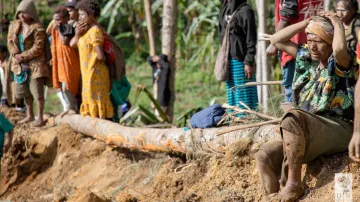A woman in Papua New Guinea lost 18 family members to a massive landslide as the country’s national disaster centre said on Monday (May 27) that more than 2,000 people were buried alive.
Evit Kambu, a local resident, said that she felt helpless as people searched around her to retrieve bodies, and added that she expected to lose more relatives from her village.
"I have 18 of my family members buried under the debris and soil that I am standing on. And a lot more family members in the village I cannot count. I am the landowner here, thank you to all those who've come to help us. But I cannot retrieve the bodies so I am standing here helplessly," said Kambu, who lost his entire family members.
VIDEO: Survivor Evit Kambu has lost 18 family members in the landslide
Over 2,000 buried under the debris
The number of those buried around Yambali village in Enga province in the country's north is based on estimates from local authorities and has been steadily rising since Friday's (May 24) landslide. A UN agency put the estimated death toll at more than 670 people on Sunday. The National Disaster Centre raised the toll again to 2,000 in a letter to the UN on Sunday that was released publicly on Monday.
The International Organisation for Migration's chief of mission in Papua New Guinea, Serhan Aktoprak, said some locals have been reluctant to welcome heavy machinery to remove debris in order to preserve the integrity of the corpses. "To make things worse, there is water flowing underneath the debris and the floor, soil, ground on which the debris sits. So we fear that this mud can turn the ground into a slide,” he added.
Locals did not using modern machines to dig out bodies
"And because of the sensitivities involved with respect to mourning and grieving we have been told until yesterday people were not necessarily very keen on welcoming heavy machinery to start operating even with the very good intentions of helping to remove the debris because they would like to preserve the integrity of the corpses, as much as they can," he said.
"But the problem is, it is so deep. It's very difficult to recover the bodies from underneath the heavy debris and the land is still sliding. Rocks are continuing to fall. The pressure that is coupled with the heavy bulk on the ground that has not been affected neighbouring, however, the debris is leading to cracks," he noted.
Treacherous terrain and the difficulty of getting aid to the site raises the possibility that few survivors will be found, humanitarian organisations said. The remote location and nearby tribal warfare are also hampering relief efforts, they added.
(With inputs from agency)
Also Read: Papua New Guinea mayhem: Over 2,000 people buried in deadly landslide, local authorities tell UN I VIDEO
Latest World News
